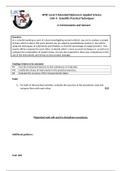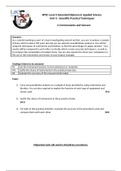All 5 results
Sort by
Best selling BTEC First in Applied Science: Principles of Applied Science Student Book notes
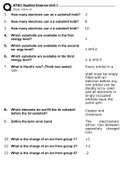
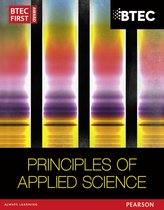 Popular
Popular
-
BTEC APPLIED SCIENCE: UNIT 11 - Learning Aim D
- Exam (elaborations) • 61 pages • 2023 Popular
-
- $13.49
- + learn more
1. How many electrons can an s subshell hold? 2 2. How many electrons can a p subshell hold? 6 3. How many electrons can a d subshell hold? 10 4. Which subshells are available in the first energy level? 5. Which subshells are available in the second en- ergy level? 6. Which subshells are available in the third energy level? s s and p s, p and d 7. What is Hund's rule? (Think bus seats!) Every orbital in a sub- shell must be singly filled with an electron before any one orbital can be d...
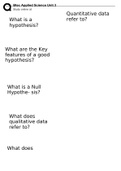
 Popular
Popular
-
BTEC APPLIED SCIENCE: UNIT 3- Learning Aim D
- Exam (elaborations) • 53 pages • 2023 Popular
-
- $13.49
- + learn more
What is a hypothesis? What are the Key features of a good hypothesis? What is a Null Hypothe- sis? What does qualitative data refer to? What does Quantitative data refer to? An Idea that you can test using practical exper- iments A good Hypothesis must: Be able to be tested scien- tifically Relate one dependent variable to on independent variable States that there is no relationship or causality, for example, no relation between the temperature and the rate of reaction. It refers to...
Newest BTEC First in Applied Science: Principles of Applied Science Student Book summaries

 New
New
-
BTEC APPLIED SCIENCE: UNIT 3- Learning Aim D
- Exam (elaborations) • 53 pages • 2023 New
-
- $13.49
- + learn more
What is a hypothesis? What are the Key features of a good hypothesis? What is a Null Hypothe- sis? What does qualitative data refer to? What does Quantitative data refer to? An Idea that you can test using practical exper- iments A good Hypothesis must: Be able to be tested scien- tifically Relate one dependent variable to on independent variable States that there is no relationship or causality, for example, no relation between the temperature and the rate of reaction. It refers to...

 New
New
-
BTEC APPLIED SCIENCE: UNIT 11 - Learning Aim D
- Exam (elaborations) • 61 pages • 2023 New
-
- $13.49
- + learn more
1. How many electrons can an s subshell hold? 2 2. How many electrons can a p subshell hold? 6 3. How many electrons can a d subshell hold? 10 4. Which subshells are available in the first energy level? 5. Which subshells are available in the second en- ergy level? 6. Which subshells are available in the third energy level? s s and p s, p and d 7. What is Hund's rule? (Think bus seats!) Every orbital in a sub- shell must be singly filled with an electron before any one orbital can be d...
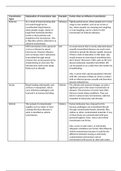
 New
New
-
Unit 43 Assignment 2
- Essay • 6 pages • 2019 New
-
Available in package deal
-
- $6.90
- 6x sold
- + learn more
P3: Carry out an investigation into the spread of diseases and infections. M3: Explain how and why these infections and diseases spread in the way that they do. D3: Assess the factors which explain the spread of these diseases and infections. *DO NOT COPY, IT WILL SHOW THAT YOUR WORK HAS BEEN PLAGIARISED. MY WORK IS MADE AVAILABLE FOR YOU TO READ & UNDERSTAND :SO USE IT AS A GUIDE.COMPLETELY CHANGE & REWRITE IN YOUR OWN WORDS*
Do you also write study notes yourself? Put them up for sale and earn every time your document is purchased.
TWO Units in one for a discounted price
Task 2: (M3) • Justify the use of these instruments and sensor. • Give a reason for why each was a suitable choice in terms of accuracy and precision.

Did you know that on average a seller on Stuvia earns $82 per month selling study resources? Hmm, hint, hint. Discover all about earning on Stuvia

